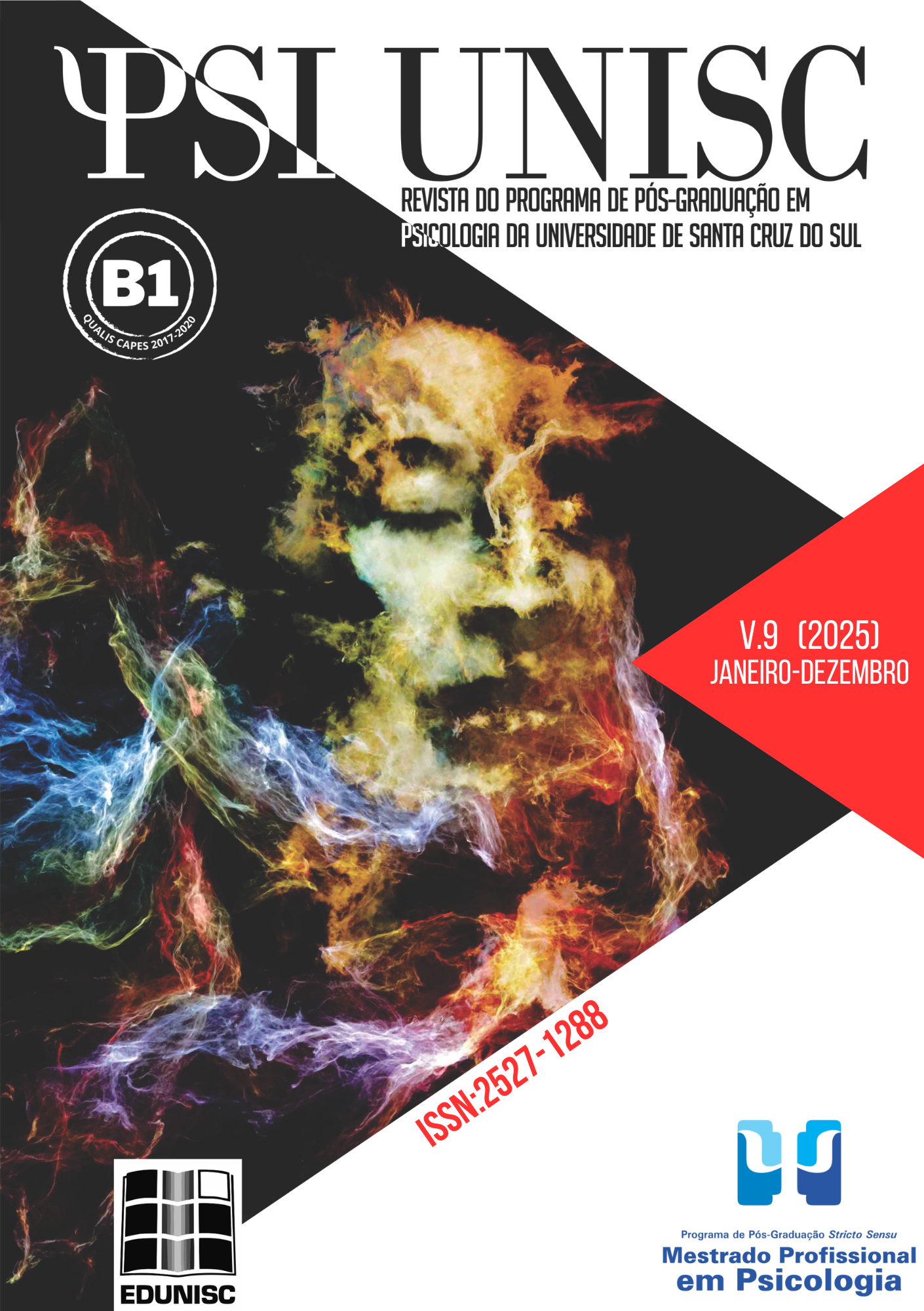Saúde mental das mulheres, maternidade e carreira: uma revisão da literatura
DOI:
https://doi.org/10.17058/psiunisc.v9i.18526Palavras-chave:
saúde mental, carreira, maternidadeResumo
Introdução: As inúmeras conquistas laborais das mulheres no mundo do trabalho, asseguradas pela garantia dos seus direitos trabalhistas e ampliação de seus espaços de atuação no mercado de trabalho, são um forte retrato das transformações socioculturais e econômicas das relações de gênero a respeito dos papéis sociais historicamente construídos para as mulheres. Se, de um lado, tais conquistas representam avanços laborais significativos, de outro reatualizam o debate sobre saúde mental das mulheres no enfrentamento dos papéis tradicionais de gênero e a conciliação entre maternidade e carreira. Com maior presença no mercado de trabalho, os desafios para conciliar carreira e maternidade estão cada vez mais presentes na vida das mulheres mães. Um dos maiores desafios evidenciados é a saúde mental na nova rotina após a vinda do primeiro filho. Objetivos: O objetivo deste artigo é analisar a produção científica de estudos sobre saúde mental das mulheres que buscam conciliar maternidade e carreira. Método: Foram realizadas buscas nas bases de dados Capes e BVS-Saúde e 76 artigos foram encontrados, dos quais 03 foram selecionados a partir dos critérios estabelecidos. Resultados: Da análise dos achados, quatro pontos foram destacados: a naturalização dos papéis de gênero que responsabiliza unicamente às mulheres para criarem, individualmente, estratégias de gerenciamento das inúmeras demandas maternas e laborais; a relevância da rede de apoio para a promoção do autocuidado; a necessidade de observar os diferentes contextos sociais e econômicos que impactam na criação das redes de apoio e a crença de que a conciliação é algo possível de ser realizado, não sem conflitos.
Downloads
Referências
Alvarenga, P., Souto, L. N., Oliveira, H. P., & Santana, I. G. (2018). Variáveis sociodemográficas e saúde mental materna em contexto de vulnerabilidade social. Psicologia, Saúde & Doenças, 19(3), 776–788. https://doi.org/10.15309/18psd190324
Angerami, S., & Angerami, F. (2012). Bem me quer, Malmequer: Histórias verdadeiras de mulheres e suas escolhas de carreiras. Évora.
Badinter, E. (1985). Um amor conquistado: O mito do amor materno. Nova Fronteira.
Badinter, E. (2010). O conflito: A mulher e a mãe. Relógio D’Água Editores.
Beltrame, G. R., & Donelli, T. M. S. (2012). Maternidade e carreira: Desafios frente à conciliação de papéis. Aletheia, (38-39), 206–217. http://www.periodicos.ulbra.br/index.php/aletheia/article/view/3374
Biffi, M., & Granato, T. M. M. (2017). Projeto de ter filhos: Uma revisão da literatura científica nacional e internacional. Temas em Psicologia, 25(1), 207–220. https://doi.org/10.9788/TP2017.1-14Pt
Bronfenbrenner, U. (1996). A ecologia do desenvolvimento humano: Experimentos naturais e planejados. Artes Médicas.
Brunoni, A. R., Suen, P. J. C., Bacchi, P. S., Razza, L. B., Klein, I., Santos, L. A. dos, Santos, I. S., Valiengo, L. C. L., Gallucci-Neto, J., Moreno, M. L., Pinto, B. S., Félix, L. C. S., Sousa, J. P., Viana, M. C., Forte, P. M., Cardoso, M. C. A. O., Bittencourt, M. S., Pelosof, R., Siqueira, L. L., (...) Benseñor, I. M. (2021). Prevalência e fatores de risco de sintomas psiquiátricos e diagnósticos antes e durante a pandemia de COVID-19: Achados da coorte de saúde mental ELSA-Brasil COVID-19. Psychological Medicine, 53(2), 446–457. https://doi.org/10.1017/S0033291721001719
Carneiro, S. (2003). Enegrecer o feminismo: A situação da mulher negra na América Latina a partir de uma perspectiva de gênero. In Racismos contemporâneos (pp. 49–58). Takano Editora.
Carvalho Neto, A. M., de, Tanure, B., & Andrade, J. (2010). Executivas: Carreira, maternidade, amores e preconceitos. RAE-Eletrônica, 9(1). https://doi.org/10.1590/S1676-56482010000100004
Collins, P. H. (2019). Pensamento feminista negro: Conhecimento, consciência e a política do empoderamento (1ª ed.). Boitempo.
Crenshaw, K. (2004). A interseccionalidade na discriminação de raça e gênero. In Cruzamento: Raça e gênero (pp. 7–16). Unifem.
Departamento Intersindical de Estatística e Estudos Socioeconômicos (DIEESE). (2023a). As dificuldades das mulheres chefes de família no mercado de trabalho. https://www.dieese.org.br/boletimespecial/2023/mulheres2023.pdf
Departamento Intersindical de Estatística e Estudos Socioeconômicos (DIEESE). (2023b). Mulheres: Inserção no mercado de trabalho. https://www.dieese.org.br/infografico/2023/infograficosMulheres2023.html
Dutra, J. S. (2017). Gestão de carreiras: A pessoa, a organização e as oportunidades (2ª ed.). Atlas.
Evans, K. L., Millsteed, J., Richmond, J. E., Falkner, M., Falkner, T., & Girdler, S. J. (2016). Working sandwich generation women utilize strategies within and between roles to achieve role balance. PLoS ONE, 11(6), e0157469. https://doi.org/10.1371/journal.pone.0157469
Giordani, R. C. F., Piccoli, D., Bezerra, I., & Almeida, C. C. B. (2018). Maternidade e amamentação: Identidade, corpo e gênero. Ciência & Saúde Coletiva, 23(8), 2731–2739. https://doi.org/10.1590/1413-81232018238.14612016
Gomes, A. G., Donelli, T. M. S., Piccinini, C. A., & Lopes, R. S. (2008). Maternidade em idade avançada: Aspectos teóricos e empíricos. Interação em Psicologia, 12(1), 99–106. https://doi.org/10.5380/psi.v12i1.5242
Guimarães, M. da G. V., & Petean, E. B. L. (2012). Carreira e família: Divisão de tarefas domiciliares na vida de professoras universitárias. Revista Brasileira de Orientação Profissional, 13(1), 103–110. http://pepsic.bvsalud.org/scielo.php?script=sci_arttext&pid=S1679-33902012000100011
Hays, S. (1996). The cultural contradictions of motherhood. Yale University Press.
Hirata, H., & Kergoat, D. (2007). Novas configurações da divisão sexual do trabalho. Cadernos de Pesquisa, 37(132), 595–609. https://doi.org/10.1590/S0100-15742007000300005
hooks, b. (2018). O feminismo é para todo o mundo. Rosa dos Tempos.
hooks, b. (2019). Teoria feminista: Da margem ao centro. Perspectiva.
Instituto Brasileiro de Geografia e Estatística (IBGE). (2018). Estatísticas de gênero: Indicadores sociais das mulheres no Brasil. https://biblioteca.ibge.gov.br/visualizacao/livros/liv101551_informativo.pdf
Instituto Brasileiro de Geografia e Estatística (IBGE). (2022). As mulheres do Brasil. https://educa.ibge.gov.br/jovens/materias-especiais/22052-as-mulheres-do-brasil.html
Lei nº 13.467, de 13 de julho de 2017. Altera a Consolidação das Leis do Trabalho (CLT), aprovada pelo Decreto-Lei nº 5.452, de 1º de maio de 1943, e as Leis nº 6.019, de 3 de janeiro de 1974, 8.036, de 11 de maio de 1990, e 8.212, de 24 de julho de 1991, a fim de adequar a legislação às novas relações de trabalho. Presidência da República. https://www.planalto.gov.br/ccivil_03/_ato2015-2018/2017/lei/l13467.htm
London, M., & Stumpf, S. (1982). Managing careers. Addison-Wesley.
Lopes, M. N., Dellazanna-Zanon, L. L., & Boeckel, M. G. (2014). A multiplicidade de papéis da mulher contemporânea e a maternidade tardia. Temas em Psicologia, 22(4), 917–928. https://doi.org/10.9788/TP2014.4-18
Maluf, S. W., & Tornquist, C. S. (Orgs.). (2010). Gênero, saúde e aflição: Abordagens antropológicas. Letras Contemporâneas.
Mandalozzo, S. (1996). A maternidade no direito do trabalho. Juruá.
Manente, M. V., & Rodrigues, O. M. P. R. (2016). Maternidade e trabalho: Associação entre depressão pós-parto, apoio social e satisfação conjugal. Pensando Famílias, 20(1), 99–111. http://pepsic.bvsalud.org/scielo.php?script=sci_arttext&pid=S1809-99272016000100008
Marks, I. M. (1987). Fears, phobias and rituals. Oxford University Press.
Melo, C. V. B. de. (2019). Proteção à maternidade e licença parental no mundo. Rede Virtual de Bibliotecas. https://www.lexml.gov.br/urn/urn:lex:br:rede.virtual.bibliotecas:artigo.revista:2020;1001204910
Michel, K. D., & Nunes, M. P. (2021). Mães gestoras – Uma análise da influência da maternidade na vida profissional das líderes. Espacio Abierto, 31(1), 30–54. https://www.redalyc.org/journal/122/12270216002/html/
Ministério da Saúde. (2021). Painel de casos de doença pelo coronavírus 2019 (COVID-19). https://covid.saude.gov.br/
Oliveira, S. C., Faria, E. R., Sarriera, J. C., Piccinini, C. A., & Trentini, C. M. (2011). Maternidade e trabalho: Uma revisão da literatura. Interamerican Journal of Psychology, 45(2), 271–280. https://www.redalyc.org/articulo.oa?id=28421251011
Pateman, C. (1993). O contrato sexual. Paz e Terra.
Pinheiro, L., Galiza, M., & Fontoura, N. (2009). Novos arranjos familiares, velhas convenções sociais de gênero: A licença-parental como política pública para lidar com essas tensões. Revista Estudos Feministas, 17(3), 851–859. https://doi.org/10.1590/S0104-026X2009000300013
Scott, J. (1995). Gênero: Uma categoria útil de análise histórica. Educação & Realidade, 20(2), 71–99. https://seer.ufrgs.br/index.php/educacaoerealidade/article/view/71721
Shreffler, K. M. (2017). Contextual understanding of lower fertility among U.S. women in professional occupations. Journal of Family Issues, 38(2), 204–224. https://doi.org/10.1177/0192513X166347
Vanalli, A. C. G., & Barham, E. J. (2008). A demanda para políticas públicas adicionais para trabalhadores com filhos pequenos: O caso de professoras. Temas em Psicologia, 16(2), 231–241. http://pepsic.bvsalud.org/scielo.php?script=sci_arttext&pid=S1413-389X2008000200011
Véras, E. A., & Oliveira, F. P. M. (2017). Políticas públicas para a maternidade: Uma análise das licenças por maternidade e paternidade à luz da igualdade e da sustentabilidade social. Revista de Direito do Trabalho e Meio Ambiente do Trabalho, 3(1), 115–134. https://doi.org/10.26668/IndexLawJournals/2525-9857/2017.v3i1.1805
Yavorsky, J. E., Dush, C. M. K., & Schoppe-Sullivan, S. J. (2015). The production of inequality: The gender division of labor across the transition to parenthood. Journal of Marriage and Family, 77(3), 662–679. https://doi.org/10.1111/jomf.12189
Zanatta, E., Pereira, C. R. R., & Alves, A. P. (2017). A experiência da maternidade pela primeira vez: As mudanças vivenciadas no tornar-se mãe. Pesquisas e Práticas Psicossociais, 12(3), 1–16. http://pepsic.bvsalud.org/scielo.php?script=sci_arttext&pid=S1809-89082017000300005
Zanello, V. (2018). Saúde mental, gênero e dispositivos: Cultura e processos de subjetivação. Appris.
Downloads
Publicado
Edição
Seção
Licença
A submissão de originais para este periódico implica na transferência, pelos autores, dos direitos de publicação impressa e digital. Os direitos autorais para os artigos publicados são do autor, com direitos do periódico sobre a primeira publicação. Os autores somente poderão utilizar os mesmos resultados em outras publicações indicando claramente este periódico como o meio da publicação original. Em virtude de sermos um periódico de acesso aberto, permite-se o uso gratuito dos artigos em aplicações educacionais e científicas desde que citada a fonte conforme a licença CC-BY da Creative Commons.




